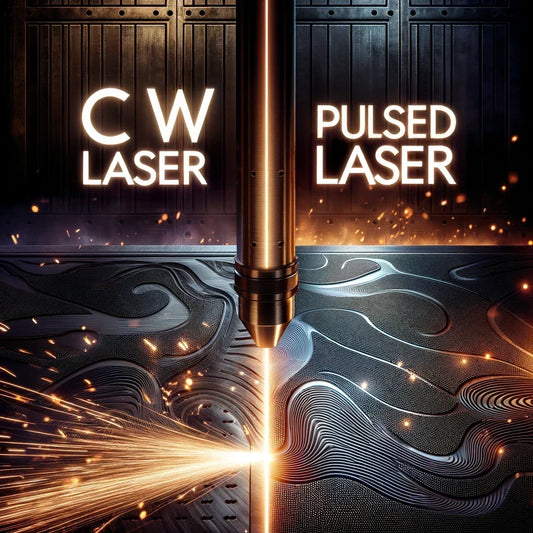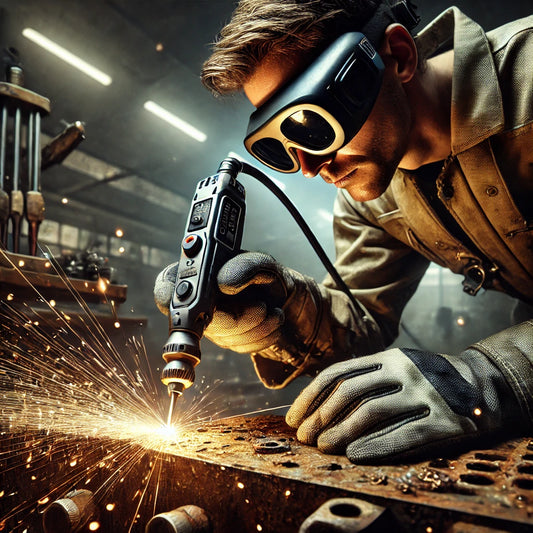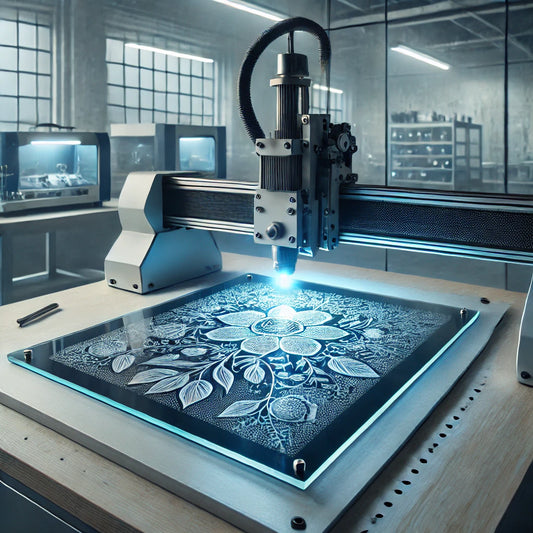![10 Factors to Consider When Purchasing a Fiber Laser [The Ultimate Buyers Guide]](http://lasersonly.com/cdn/shop/articles/10_Factors_to_Consider_When_Purchasing_a_Fiber_Laser_The_Ultimate_Buyers_Guide_1.png?v=1677258049&width=1100)
10 Factors to Consider When Purchasing a Fiber Laser [The Ultimate Buyers Guide]
![10 Factors to Consider When Purchasing a Fiber Laser [The Ultimate Buyers Guide]](https://cdn.shopify.com/s/files/1/0514/1099/3312/files/10_Factors_to_Consider_When_Purchasing_a_Fiber_Laser_The_Ultimate_Buyers_Guide_1.png?v=1677258109)
Are you planning to buy a laser machine? Selecting laser equipment is never a simple thing. Researching laser types, machines’ features and technical parameters, and how different materials are affected by laser could be overwhelming, especially with the myriad options available on the market. Equally important is to estimate the equipment benefits and the return on your investment to get the best value for your money.
Before you start your search, you should ask yourself a few questions. In this post, we will discuss ten essential factors to consider when purchasing a fiber laser machine. We will help you focus on your needs and provide valuable insights to assist you in making an informed decision and choosing the right fiber laser machine.
1. Fiber Laser Machine Application: Pro vs. Hobby
Fiber laser machines are highly versatile and can be used for various applications in different industries, they became valuable tools for businesses and organizations of all sizes. Moreover, these machines are popular among hobbyists, craftsmen, small-scale manufacturers, and entrepreneurs who want to expand their businesses or start new ones. They are also commonly used in small workshops or garage-based businesses.
If you are looking for equipment for your business, device productivity should be at the top of your requirements. You should consider the following productivity key factors:
- Power - Fiber lasers for industrial use typically have higher power output than those for home use. With higher power you have more flexibility, and you can process thicker materials and complete jobs faster
- Capabilities - Industrial fiber lasers are designed to handle heavy-duty cutting and welding tasks, such as cutting thick metal sheets, welding large structures, and marking on large surfaces. In contrast, home-use fiber lasers are usually designed for more hobbyist or DIY applications such as small parts cutting or engraving.
- Features - Industrial fiber lasers often have advanced features such as high precision and accuracy, high speed, high-quality beam quality, and high stability. Home-use fiber lasers may have more basic features and are often intended for simpler applications.
- Size - Laser machines range drastically in size, from small desktop engraving machines to large gantry-style engraving machines. You also need to consider the machine’s power consumption, ventilation, and safety requirements.
- Cost - Industrial fiber lasers are generally more expensive than home-use lasers due to their higher power and advanced features.
2. Fiber Laser Machine Functionality
Fiber laser machines use a fiber laser source that generates a laser beam through a specialized optical fiber. This beam is then directed through a series of mirrors and lenses to focus the energy onto the material's surface. The intense heat generated by the laser beam causes the material to melt, vaporize, or burn away, creating precise cuts, engravings, or markings.
Ask yourself a question, what do I want to do with a fiber laser? Are you in the business of custom gift items, signs, jewelry, or are you an auto repairer, or a metal fabrication shop? There are a variety of laser machines available on the market for specific tasks. There are lasers for metal cutting, marking, engraving, surface cleaning, welding, etc. The lasers also differ by the laser source type, which determines what materials the laser can be used on. Knowing what operation you want to perform with the laser, will help you choose the right type of laser machine.
Cutting: Fiber laser cutting machines are engineered to produce powerful, high-precision beams that can swiftly and efficiently cut through various materials, including metal, plastic, and wood. These machines generally possess high power output, exceptional accuracy, and high cutting speeds.
Engraving: Fiber laser engraving systems are specifically designed for high-speed and high-precision operations that can mark and engrave text, images, photos, barcodes and designs on a variety of surfaces, including metal, plastic, and glass. These machines are known for their precision and speed.
Welding: Fiber laser welding equipment utilizes high-power, high-quality beams to weld the same or different types of metal. These machines are built with high power output, accuracy, and stability.
Cleaning: Fiber laser cleaning machines are constructed with high-power laser source that can clean material surfaces, including metal, wood, and concrete. These machines are known for their high power and efficiency.
3. Laserable Materials
There is a wide range of laserable materials that can be permanently marked and cut with a laser machine. The ability to transform everyday materials into business opportunities makes a laser machine one of the best investments you can make.
Here is a list of common materials that can be laser engraved:
- Granite - Popular applications include personalization of granite memorials, granite counter tops, outdoor signage and flooring.
- Brick and Stone - Applications include, but aren’t limited to: fundraising bricks, stepping stones, retaining walls and landscaping features.
- Glass and Crystal - There are many applications for glass and crystal, some of the more popular include: awards, personalized gifts, interior and furniture design and glass packaging, jars of food, bottles for drinks, cosmetic and pharmaceuticals.
- Wood - Applications for wood are quite vast, and include: custom flooring, cabinets, furniture, gun stocks, personalized gifts, business cards, signage, awards and integrating into schools/universities.
- Plastics and Acrylic - Applications include: indoor and outdoor signage, plastic part marking/cutting and architectural mock-ups.email us
- Metals - Popular metal applications include: metal part marking (tools, machine parts etc.), automotive applications, personalization of firearms, jewelry, metal urns and awards. Coated metals can be successfully engraved/marked, however un-coated, bare metals require a marking compound.
- Rubber - The most common rubber applications are tire marking, rubber stamp creation and part handles.
- Leather and Fabric - Applications for fabric engraving and cutting include fashion design, interior design and textile creation/modification.
The specific materials that a fiber laser can work with depend on the laser source type and its power. Laser’s wavelength is one of the parameters that define the laser's capability to affect a material. That is why it is essential to consider the material properties and the intended application when choosing a fiber laser machine. If you’d like to have your material tested in our lab, email us or call 212-476-9078 to speak to a representative.
4. Fiber Laser Machine Size
The answer to this question depends on your plans for the laser machine and the largest-size material you plan on engraving or cutting. The size of the machine will ultimately determine the size of the material and ease of engraving ability. The bigger is better rule doesn’t apply in all cases when selecting a fiber laser machine. Yes, if you have a bigger machine you have more options and opportunities to cut larger objects, but in case of laser engraving having a larger working area means that the laser focal length is larger as well, which reduces the machine’s power.
Therefore, when choosing fiber laser equipment, it is crucial to consider the following factors:
- Material Size: You need to consider the largest size of your products when choosing the fiber laser machine or the use of additional equipment, such as a conveyor belt or XY-moving worktables, a rotary attachment, to ensure you can reach the entire material's surface.
- Object’s Shape: Depending on the shape of your product, you need to research the laser capabilities or available accessories to handle non-flat objects, such as rotary axis attachment for cylindrical objects.
- Materials Handling: Handling large or oversized materials is another important factor. Specialized equipment, such as conveyors, material handling robots, or automated systems, may be required to handle and position the materials for processing.
5. Fiber Laser Machine Pre-Sale Options
Knowing that the chosen laser equipment is right for you, is a great first step. Find out which supplier offer demonstrations and material tests. It’s always a good idea to ask your dealer to run a sample cut or engraving on your material.
The investment in a laser machine should be well-planned. You should find out about possible financing or leasing options before you buy. With financing options, you can start earning money with it immediately without a large upfront investment. Furthermore, leasing rates are tax deductible as business expenses and offer planning security thanks to the compiled financing plan. Get lots of information before making a purchase decision.
6. Fiber Laser Machine Installation & Operation
When selecting your fiber laser machines, it’s equally important to learn how easy it’s to operate this equipment, and what’s involved in the initial setup. All modern equipment is operated by a software application. Finding out software’s features and functions, compatibility with operating systems, and accepted graphical files formats, is a good practice. It’s important to have comprehensive documentation on the installation procedure and software manual. Fast setup and easy to learn and operate software are the factors that drive the selection of the fiber laser machine.
Understanding the proper usage of the machine and correct operation ensures the fiber laser machine is running at optimal performance, minimizing downtime and maximizing output. This helps keep up with the demands of the production cycle, reducing the need for costly repairs and downtime.
7. Fiber Laser Machine Lifespan & Maintenance
The frequency of use is another important factor to consider when choosing the fiber laser machine. The longevity and reliability of a laser machine are essential when it is intended for frequent utilization in a production line. To meet these demands, it is critical to invest in a device with a long lifespan laser source and quality parts and components that can withstand the stress of heavy usage.
Another factors to consider are the maintenance routine and consumable products, because they affect the cost and time of your production. Moreover, if the production cycle is expected to increase in the future, it is crucial to choose a machine that is scalable so that it can be upgraded to meet the increased demand.
8. Fiber Laser Machines Accessories
It’s important to find out which accessories are available on the market for your laser machine. Having more options is always better, because you could increase your revenue by simply adding another product line with a use of an accessory to the laser without another big investment in new machinery.
Some common accessories for fiber laser machines include:
- Protective Eyewear - It is important to protect the eyes from intense laser light.
- Field Lenses - Larger lens sizes increase the working area of the laser and smaller lens sizes increase the laser power output and precision.
- Lens Cleaning Supplies - You may need them to keep the lens clean and free of debris, which can affect the quality of the laser beam.
- Cooling Systems - Some fiber laser machines require a cooling system to maintain optimal temperature and prevent overheating.
- Nozzles - These are used to direct the laser beam toward the material being processed.
- Chiller - To maintain the laser's consistent temperature and keep it cool.
- Dust Collector - To eliminate the dust caused by cutting or engraving.
- Fume Exhaust System - To vent the fumes caused by cutting or engraving.
- Rotary Axis - A motor-driven attachment for work on cylindrical objects.
- Vise - Clamping table to hold the item
- Auto-Focus - A device that helps to position the laser head at the correct focal length automatically
It's essential to check with the manufacturer to ensure that you have all the necessary accessories before the purchase. Some manufacturers and sellers may provide a list of recommended accessories for a specific application. If you are not sure what accessories you need, contact our support at 212-476-9078 or by email, and we will help you with your choice.
9. Fiber Laser Machine Warranty and After-Sales Support
Warranty and post-purchase support are important considerations when buying a fiber laser machine because they provide peace of mind and protection for your investment.
- Warranty: A warranty ensures that the manufacturer will cover any manufacturing defects or malfunctions for a specified period. If a problem arises due to a manufacturing defect, the manufacturer will repair or replace the machine at no cost to the buyer.
- Post-purchase Support: This includes technical assistance, software upgrades, and troubleshooting assistance. Having access to post-purchase support means that the buyer can get help with any issues that may arise and can rely on the manufacturer to provide assistance and guidance to keep their fiber laser machine running smoothly.
- Maintenance and Repair Service: The manufacturer or supplier should offer maintenance and repair services in case of any issues with the machine. This allows to keep the device in optimal working condition and can minimize downtime due to unexpected repairs or maintenance.
- Training: Knowing how to operate and maintain the laser machine properly is essential for safety, efficiency, and prolonging the machine's lifespan. Access to training and instruction on how to use the machine will help ensure that it is used safely and effectively.
10. Fiber Laser Machine Cost
Laser machines are no longer an out-of-budget product. With advancements in laser technology in the recent years, laser machines become significantly more affordable. There are many options available on the market. You can buy equipment from a well-known western manufacturer, and enjoy all the benefits of US-based customer support and repair services. But it comes with a higher price tag. Today, you can buy your laser machine directly from a manufacturer in China at a significantly lower price, but it comes with a risk. If something goes wrong, you are on your own. LasersOnly.com offers you quality equipment at great rates with excellent pre and after-sales service. We deal with all risky aspects, and you enjoy your great equipment and our support without paying big bucks for it.
Laser machines can be paid for in a variety of ways. You can pay for your order with e-Check, Credit Cards or PayPal. We work with several financial institutions that offer different financing or leasing options. If you have your own financing company, we will work with them as well.
Conclusion
Fiber laser machines are a valuable asset for businesses and organizations of all sizes due to their versatility and ability to be used in various industries and applications. Purchasing a fiber laser machine requires careful consideration. We discussed 10 factors that can help you navigate the variety of products and select the best fiber laser machine that suits your needs. The most important factors are intended application, used material and its size, power output and cost. Additionally, equipment’s lifespan, operations, maintenance requirements, and pre- and after-sales support are essential points for consideration consider as well. We hope, this guide would help you choose the perfect fiber laser machine for your enterprise.



